Ministry in Vietnam
Dominican sisters nurture, sustain earth, people
By Sister Angela Binh Nguyen, OP (Peace)
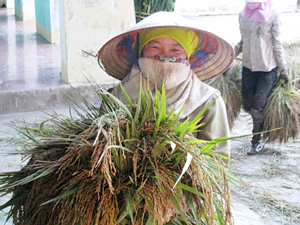 Thai-Binh means peace, and Dominican Sisters of Thai-Binh means Dominican Sisters of Peace. What a meaningful coincidence! Thai-Binh or Peace here is by no means the absence of conflict. It is the kind of peace that Jesus promises: “Not as the world gives do I give it [peace] to you. Do not let your hearts be troubled or afraid” (Jn. 14:27). It is the peace that can be found even more so in hardship and struggle. Now, living and working with Thai-Binh Dominican Sisters, I have discovered here that kind of peace which is symbolically seen in its fresh turned-over soil in both physical and spiritual sense.
Thai-Binh means peace, and Dominican Sisters of Thai-Binh means Dominican Sisters of Peace. What a meaningful coincidence! Thai-Binh or Peace here is by no means the absence of conflict. It is the kind of peace that Jesus promises: “Not as the world gives do I give it [peace] to you. Do not let your hearts be troubled or afraid” (Jn. 14:27). It is the peace that can be found even more so in hardship and struggle. Now, living and working with Thai-Binh Dominican Sisters, I have discovered here that kind of peace which is symbolically seen in its fresh turned-over soil in both physical and spiritual sense.
Thai-Binh is a land of Dominican mission since the Most Holy Rosary Province had sent its members to North Vietnam since the 17th century. Being nurtured and nourished by Dominican spirituality and piety, its Catholic faith not only survived waves of persecution but was also strengthened by the blood of its martyrs. The Dominican family has made great contributions to this faith. Then came the political upheaval of 1954 in which, as Vietnam was divided into Communist North and Republic South, thousands upon thousands of Catholics including religious, priests and bishops took refuge in the South. The many Dominican convents that Dominican fathers built in the early 20th century were then looked after by the very few who stayed behind. Thai-Binh’s Dominican roots had lied dormant all these years, awaiting its soil to be freshly turned over to yield new abundant crops.
I know many of the Thai-Binh Dominican Sisters in the North when they were in different phases of formation with the Thai-Binh Dominican Sisters in South Vietnam who are part of the Rosa de Lima Dominican Congregation. They were groups of women without vows who lived their consecrated life in the spirit of Dominican charism in various convents called Nha Mu (House of Virgins), and participated in different areas of parochial ministry. After the reunification of the North and the South of Vietnam in 1975, communication between these two groups was established, and through the initiation of Bishop Francis Xavier Nguyen Van Sang, the then bishop of Thai-Binh Diocese, starting in 1991 the women in the North, young and old, were gradually sent to the South to go through various stages of formation with the intention that they were preparing for a new Dominican Congregation for the Diocese of Thai-Binh.
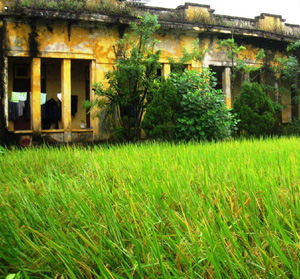 |
In 2004 the Thai-Binh Dominican Congregation was formally established. With the establishment, this new congregation of Dominicans reclaims Thai-Binh in their effort to turn over the soil physically and spiritually. They cultivate the land and rebuild the community. Visiting different convents, one could hardly fail to notice old buildings with the Dominican logo and various sayings such as “Praise, Bless and Preach,” or “Convent of Dominicans,” that are being renovated or rebuilt due to the destruction caused by the Vietnam War or lack of proper care for half of a century.
If you have read Pearl Buck’s “The Good Earth,” you are more convinced to call the earth Mother Earth. She always brings forth life more so because hardship is part of this birthing. Here the main character, Hoàng Long (Wang Lung), sticks to his land. He refuses to sell it though he faces poverty and famine, and always returns to his farming work. As a result, Mother Earth always takes care of him and his family and on the whole enables him to continue to prosper.
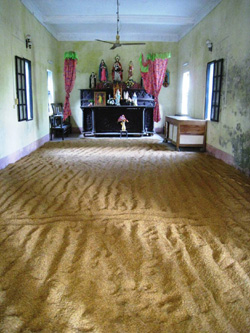 |
The lifestyle and ministry of Thai-Binh Dominican Sisters remind me of Hoàng Long. They are so close to the land that they become part of the Mother Earth. Instead of having gardens of flowers they have gardens of vegetables—rice, corn, sweet potatoes, and soil beans—to beautify their motherhouse. In some convents, rice fields with their heavy yields bending over next to their houses tell how fertile the soil is when rightly cultivated. The work on the land is laborious, but the sisters are smiling. Their love of the land shows them how to make its soil rich even though the land here has been cultivated for thousands of years.
Symbolically, with their new zeal and fervor as a new Dominican community, the sisters also freshly turn over the soil of ministry which I would call the Dominican trait: Preaching the Gospel by turning the growing and harvesting circle into a preaching act. As each house has too few sisters to harvest their fields, they invite parishioners to join them for one day or two. Instead of paying the workers, who would consider it a strange thing to be paid by the sisters, they feed the workers. When a parishioner needs help in his field, the sisters are happy to return the favor. That mutual support creates a close bond between the sisters and people.
That bond naturally leads the sisters into different aspects of ministry in parishes. They teach religious classes, especially those that prepare children for the sacraments. They serve as music directors, bring Communion to the homebound, and prepare non-Catholics for the Sacraments of Initiation. Dominican preaching does not only include religious activities but also transforms the environment for the betterment of life. The sisters have job training programs for poor women in different towns and are in cooperation with various agencies to provide financial support for poor children so that they may have the opportunity to be in school or to start college. The Thai-Binh Dominican Sisters are also in charge of food services for Thai-Binh Diocese’s seminary.
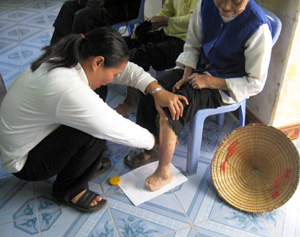 |
What touches me the most is the sisters’ ministry to lepers. A long ride on the motorcycle brought me to a leprosy center of more than 500 patients where two young Thai-Binh Dominican Sisters have volunteered their service for over four years. They are most at home among the lepers, reaching out to help them to make life as normal as possible. One of their main services is to take the measurement of the lepers’ feet and make sandals for them. When sandals are ready, the sisters bring them to each patient to try on. Spending one day there and observing how they serve the lepers, I was deeply touched by their tender loving care. They help create a vibrant human spirit in one of the most inhuman conditions in which this terrible disease gradually eats up their bodies and threatens to take away their dignity. Their service is a powerful preaching in action.
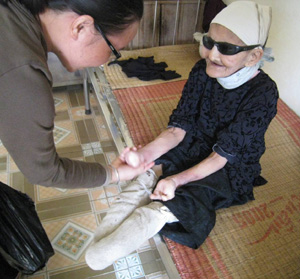 The joy radiated through the sisters’ service is contagious. A 90-year-old woman, though blind and with deformed hands and feet, always has a cheerful smile for those around and visitors as well. A man with only one foot can still make brooms for his own use and for his neighbors who cannot do so. What is more amazing is an 86-year-old woman whose hands are stripped off of all their fingers, writing a report for her group. The sisters also visit 300 other lepers who are still able to live in their respective communities.
The joy radiated through the sisters’ service is contagious. A 90-year-old woman, though blind and with deformed hands and feet, always has a cheerful smile for those around and visitors as well. A man with only one foot can still make brooms for his own use and for his neighbors who cannot do so. What is more amazing is an 86-year-old woman whose hands are stripped off of all their fingers, writing a report for her group. The sisters also visit 300 other lepers who are still able to live in their respective communities.
On this soil, freshly turned over physically and spiritually, the Thai-Binh Dominican Sisters are eloquently preaching the Gospel by bringing God into the life of the poor, the sick and parishioners. Here I am reminded of the words of our Master General of the Order, Fr. Bruno Cadoré, to Sister Margaret Ormond, on his return from Santo Domingo and Haiti where the 500th year was celebrated: “It was a good congress, and a strong opportunity to remember the roots of the mission of all our Dominican Family.”




